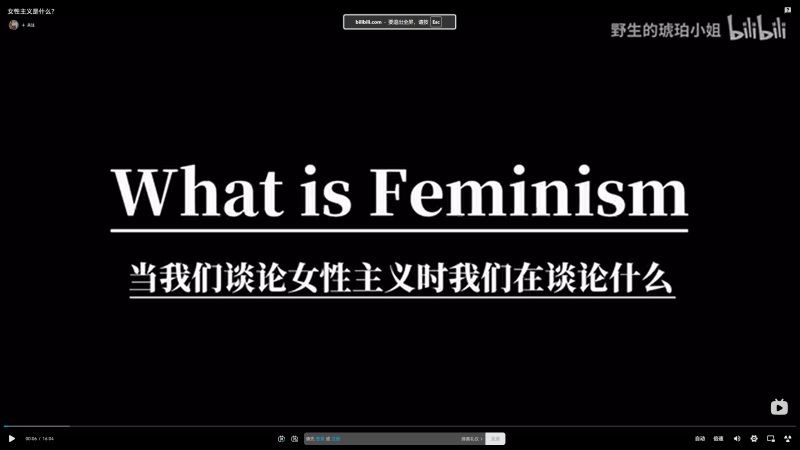What is Feminism?: From Beauvoir to Contemporary Controversies
Video Description
In this episode 'What is Feminism?', Bilibili creator Wild Amber Miss traces the development of feminism in an accessible way, starting from Simone de Beauvoir's philosophical thought to explore core feminist issues, social misunderstandings, and contemporary controversies. The video combines book reviews, cultural critique, and personal reflection, representing one of the key introductory feminist content pieces in the Chinese context.
In this enlightening episode “What is Feminism?”, Bilibili creator Wild Amber Miss approaches the subject from Descartes’ philosophical perspective of “I think, therefore I am,” attempting to answer fundamental questions about feminism: Why are women not “naturally born women”? Why does feminism remain important today? The video combines insights from Simone de Beauvoir’s “The Second Sex” with social phenomena and personal observations to explore the following topics:
Core Issues: Fundamental Propositions of Feminism
”Women Are Not Born”
Quoting Beauvoir’s famous line “One is not born, but rather becomes, woman,” the video emphasizes that gender is socially constructed, with female identity shaped by culture, education, and institutions.
The creator thoughtfully unpacks how this seemingly simple statement challenges essentialist views of gender, demonstrating through concrete examples how societal expectations mold behavior, preferences, and self-perception from early childhood.
The Hidden Logic of Patriarchy
Through everyday examples such as household division of labor and workplace bias, the video analyzes how patriarchal structures influence women’s choices and self-awareness in ways that often go unnoticed.
The discussion reveals how seemingly neutral social arrangements actually reinforce gender hierarchies, making these power structures appear natural rather than constructed.
Misconceptions and Stigmatization of Feminism
The video critiques the stereotype that “feminism equals man-hating,” pointing out that feminism is not about opposing men but rather fighting for structural equality and freedom.
Wild Amber Miss addresses common misunderstandings with patience and clarity, explaining how these misconceptions serve to discredit legitimate calls for gender equality.
Contemporary Controversies and Cultural Reflection
”Radical Feminism” and Social Resistance
The creator points out that feminism in the Chinese context is often stigmatized as “radical,” reflecting society’s resistance to and misinterpretation of gender equality issues.
The video examines how the label of “extremism” is often applied to feminist advocacy as a way to delegitimize demands for change, particularly in conservative cultural contexts.
The Diversity of Feminism
The video emphasizes that feminism is not a monolithic theory but encompasses various schools including liberal, radical, and intersectional approaches, and should not be oversimplified into labels.
Wild Amber Miss introduces viewers to the rich theoretical diversity within feminist thought, helping audiences understand that feminism is a complex field of study rather than a single ideology.
Intersectionality in Chinese Context
The creator thoughtfully addresses how feminist theory, primarily developed in Western contexts, applies to Chinese society, discussing both universal principles and culturally specific challenges.
This section demonstrates sophisticated understanding of how feminist concepts must be adapted and interpreted within different cultural and historical frameworks.
Educational Approach and Impact
The video stands out for its pedagogical approach, making complex philosophical and sociological concepts accessible to a general audience. Wild Amber Miss employs:
- Clear analogies and examples that resonate with everyday experience
- Balanced presentation that acknowledges different perspectives while maintaining a clear feminist stance
- Cultural sensitivity that respects Chinese social contexts while advocating for change
- Encouraging tone that invites reflection rather than defensive responses
Conclusion
“What is Feminism?” serves not only as an introduction to philosophy and social theory but also as an invitation to critical thinking. It reminds viewers that feminism is not a struggle of the past but a contemporary reality that still requires our response and engagement.
The video’s success lies in its ability to bridge academic feminist theory with popular understanding, making vital conversations about gender equality accessible to Chinese-speaking audiences while maintaining intellectual rigor and cultural sensitivity.
Video Info
评论与讨论
与其他观众一起讨论这个视频
加入讨论
与其他观众一起讨论这个视频
加载评论中...

